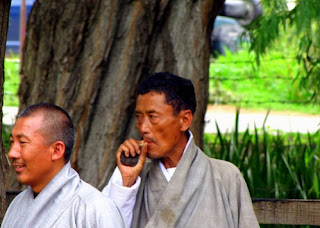
Since the Kingdom of Bhutan’s smooth transition to democracy in 2008, the population has found few issues to get riled up about.
The policy framework of Prime Minister Jigmy Y. Thinley’s government has centered around Gross National Happiness – a concept introduced by the country’s much-revered fourth king, Jigme Singye Wangchuck, which gives equal priority to economic development, the preservation of the environment and the promotion of culture among other criteria.
But the country’s tobacco ban – which is often described as draconian – is the biggest exception, sitting somewhat at odds with the GNH philosophy.
Speaking on Tuesday at an informal gathering with Indian writers, publishers and filmmakers in Paro, Bhutan, Mr. Thinley said he would not share his personal feelings on the law. However, he made it pretty clear he was not a huge fan of this piece of legislation, speaking of the “tyranny of the majority” while explaining how it came into being.
The country’s 2010 Tobacco Control Act, which builds on an earlier ban on the sale of cigarettes and other tobacco products, prohibits smoking in most public places and sets severe penalties for tobacco smuggling. People are allowed to bring small amounts of tobacco products into the country but must declare it at customs and pay hefty duties on it. Tobacco consumption is allowed in homes and in restricted areas of public places like hotels, but only if they apply for licenses.
The debate over the tobacco ban has flared up again in recent months following the first arrests under the law. Sonam Tshering, a 23-year old Buddhist monk, was the very first. In March, he was convicted to three years imprisonment on charges of smuggling, according to a court document posted on the Web site of Bhutan’s leader of the opposition.
Комментариев нет:
Отправить комментарий